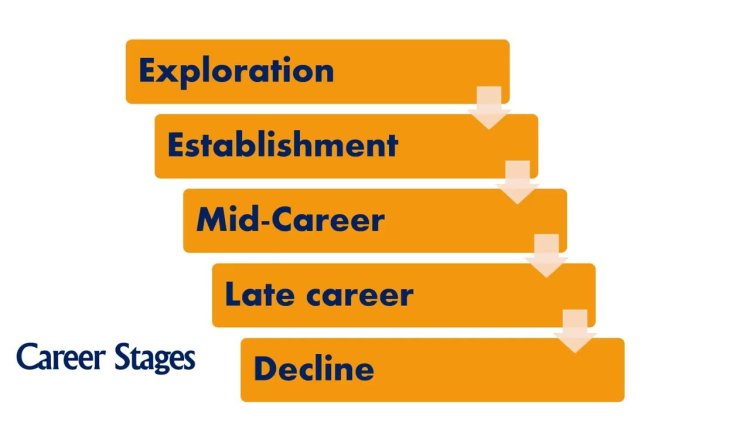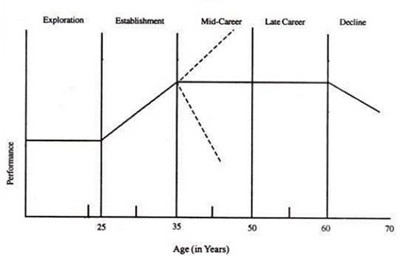The Five Career Stages and How To Succeed in Each
The establishment stage starts when a person starts looking for work. It consists of getting a person's first job.

In this video, a former senior advisor to President Barack Obama discusses how to maximise your career potential through self-improvement.
Although everyone's professional journey is unique, there are commonalities. There are typical steps that the average worker goes through in their careers. Starting with exploring potential job options and ending with retirement, there are always fresh difficulties to overcome and new ways to learn and develop.
of this post, we'll go over the five ages of a career and provide advice on how to make the most of each one.

Why are career stages important?
Differentiating your professional objectives throughout several career phases is essential. When in the former, ambition is expected and growth is encouraged, but when in the latter, stability and rest are encouraged. Having a broad perspective on your career might help you assess where you are and where you want to go.
What are the five career stages?
Career stages, also known as stages of the career life cycle, are a method of classifying where you are in your professional life. These five tiers of a career are:
1. Exploration
Typical age range: 21-25

Before settling into a permanent position, people often engage in a period of exploration. Those in this category may be seniors or graduate students. Your future career goals will begin to take shape at this point. As you start to think about your career in the long run, you may start to narrow down your alternatives.
Your job path is determined by your history and character. You might also take into account:
-
Your upbringing
-
Communication from parents
-
Feedback from teachers
-
Education
As you begin your job search, your efforts will typically include:
-
Discovering interests: Define what your passion is, what motivates you and what jobs are suited to your personality.
-
Developing basic skills: Take courses for your intended career and pass any necessary state or national exams, such as the medical licensing exam.
-
Creating expectations: Consider what type of lifestyle you want in the future and what salary range will provide this lifestyle. Think about whether you want a family and what kind of work/life balance you would like to achieve.
Tips for success in the exploration stage:
-
Explore many different career paths through shadowing, internships, part-time work and volunteering.
-
Speak to teachers and counselors about the courses and training required for careers that interest you.
-
Use your college career center to make connections with employers.
2. Establishment
Typical age range: 25-35 years old
Your first job search, application, and acceptance of a permanent position all fall under the umbrella of "establishing." You're probably going to settle for a job with relatively light duties, either as an entry-level worker or a middle manager.
At this point in life, you are focused on furthering your education and professional standing. Your job's actual requirements now supersede any ideals you may have held from the exploration phase. When you initially enter the workforce, you may be overwhelmed with feelings of uncertainty and worry due to the many new experiences and individuals you will be exposed to. There is anxiety associated with transitioning into a new period of life, but there is also excitement.
Your main objectives in the establishment stage are:
-
Learning your new job
-
Gaining acceptance from peers
-
Developing and improving your skills
It is possible to have both positive and negative early career experiences. Maintain an upbeat attitude in the face of criticism and work hard to hone your abilities.
Tips for success in the establishment stage:
-
Develop and enhance skills through workshops and continuing education courses.
-
Find a mentor in your profession you can ask for advice and guidance.
-
Use your performance reviews to help direct your skill development into specific areas of improvement.
-
Pursue certifications or licenses in your industry.
3. Mid-career
Typical age range: 35-45 years old
At this point, you may be enjoying a period of career stability and advancement, or you may be making plans to switch careers entirely. In this phase of their careers, many workers reach their highest levels of production and master the specialised knowledge required for their jobs. Your dedication to your job will shine through during these years, elevating your standing in the company. Staying loyal to your current employer will earn you more responsibility and the promotion opportunities that come with it.
You should anticipate career advancement, such as a pay rise or promotion. You might want to reevaluate your position if this doesn't happen. At this point, it could be helpful to take stock of where you are and what you've accomplished so far, both personally and professionally. You may be at a crossroads in your career, like many others your age, debating whether to stay put and work towards greater success in your current employment, or whether to try something completely different.
Work-life balance is also an issue that many people worry about at this point in their careers. Maintaining a successful career while also caring for loved ones and participating in extracurricular pursuits can be difficult.
Tips for success in the mid-career stage:
-
Speak with your supervisor about opportunities for growth and forward movement.
-
Evaluate your job satisfaction.
-
Apply for internal positions that provide a greater challenge and greater responsibilities.
-
Speak with your peers and check job boards for open positions in other companies that may align better with your career aspirations.
4. Late-career
Typical age range: 45-55 years old
Assuming you made it through the middle of your career unscathed, your late career may offer a more relaxed atmosphere at work. The senior worker can start teaching others and developing a successor rather than focusing on personal development.
There may be fewer chances for promotion, but you can find fulfilment in activities like mentoring newer staff. During this time, you won't be switching jobs often because your good name will keep you where you are.
You can start planning for the future and thinking about how you can spend less time working and more time doing the things you enjoy.
Tips for success in the late-career stage:
-
Develop interests outside of work, such as gardening, biking, or photography.
-
Join a club or group, like an alumni association or civic group.
-
Prepare for retirement financially by speaking with the human resources department and a financial advisor to detail your retirement goals.
-
Consider offering your expertise through a mentorship program, speaking at a conference or writing a book
5. Decline
Typical age range: 55-65 years old
Many people reach the point of wanting to retire after a long and successful job.
You may spend your time off from work relaxing, visiting with loved ones, or exploring the world. You can put your talents to use by engaging in previously enjoyed activities, discovering new passions, or helping others.
It's possible that you could benefit from looking into alternative methods of income generation, such as
-
Working part-time
-
Consulting on a freelance basis
-
Finding another full-time job
Tips for success in the decline stage:
-
Stay engaged with activities such as lifelong learning opportunities, painting and reading.
-
Continue to socialize by meeting with friends and family regularly.
-
Share your knowledge through teaching at a community center or college.













